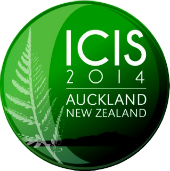Research Methods
This track invites submissions that enrich and advance research methods used in the IS discipline. We invite papers that deal with the methods of research in IS, the philosophy of research and science in IS, and/or the connection between and interplay of the two. We define research methods broadly, including theory development, research design, quantitative and qualitative data collection and analysis, critical research, and mixed research methods.
Of particular interest are studies that provide new perspectives on and examples of methods to analyze emerging IS phenomena such as social media, crowdsourcing, cloud and mobile computing, IT-related agency, as well as healthcare IT, as a few examples. The track is also interested in examples of the innovative application of methodological techniques (e.g. methodological variations that broaden or improve the use of a particular method) and where a clear methodological contribution is made.
Topics of interest include, but are not limited to:
· By means of what innovations can current research practices related to data collection (e.g., experiments, surveys, interviews, aggregating Internet-accessible data) and data analysis (e.g., SEM, econometrics, grounded theory, simulation) be improved in IS?
· With ontological lenses such as sociomateriality gaining ground in IS, how do extant data collection and analysis methods have to be adapted?
· What are the methodological and ethical considerations for the creation, sharing and reuse of large datasets from data available in the public domain?
· What are the possibilities and constraints associated with combining multiple research methods in one study? Are there more effective ways of using multiple methods to coordinate research streams?
· What can IS research learn from the methods used in reference disciplines (e.g. latent growth modeling, multi-level models, non-linear models, Bayesian methods, ethnomethodology) and what can it contribute to these and other disciplines?
· Can topics and problems that have historically been addressed through particular approaches such as experiments or surveys be re-envisioned using other techniques?
· Are there best, contingent, or recommended approaches to semiotics, hermeneutics, narrative analysis, critical discourse analysis, causal or concept mapping, content analysis, and other “qualitative” methods?
· Are there preferred methods for some research streams or problems and how can methods best be compared?
· What sorts of questions are left unanswered by our research methods? How does our concentration on the production and codification of research methods deflect our attention from the desired ends for IS research?
Track Chairs
|
Lancaster University |
|
|
Memorial University of Newfoundland |
Associate Editors
|
Miguel Aguirre-Urreta |
DePaul University |
|
Wynne Chin |
University of Houston |
|
Panos Constantinides |
University of Warwick |
|
Robert Davison |
City University of Hong Kong |
|
Bill Doolin |
Auckland University of Technology |
|
Göran Goldkuhl |
Linköping University |
|
Jörg Henseler |
Radboud University Nijmegen |
|
Allen Lee |
Virginia Commonwealth University |
|
John Mingers |
University of Kent |
|
Roland Müller |
Berlin School of Economics and Law |
|
Guy Pare |
HEC Montreal |
|
Jeffrey Parsons |
Memorial University of Newfoundland |
|
Mikko Rönkkö |
Aalto University |
|
Chris Street |
University of Regina |
|
Jason Thatcher |
Clemson University |
|
Ron Thompson |
Wake Forest University |



